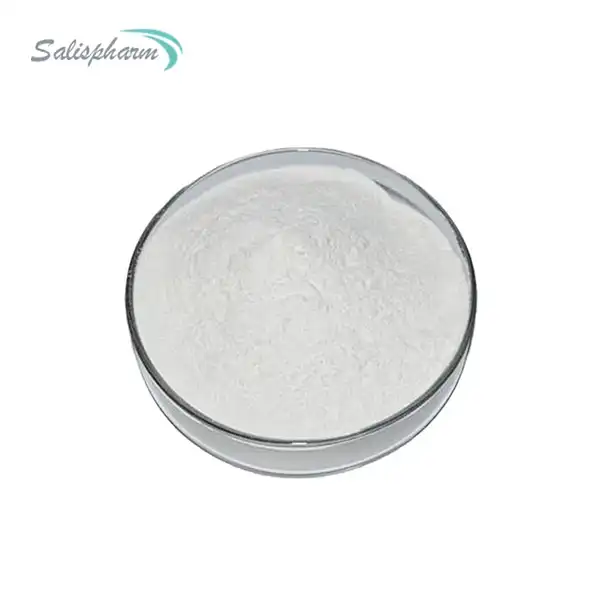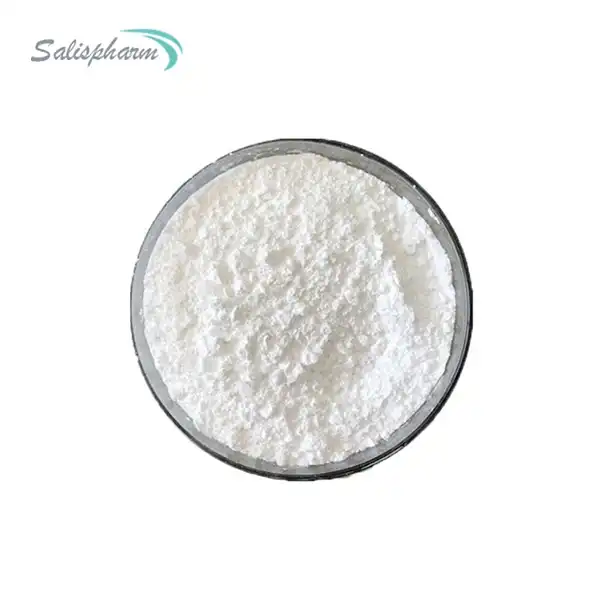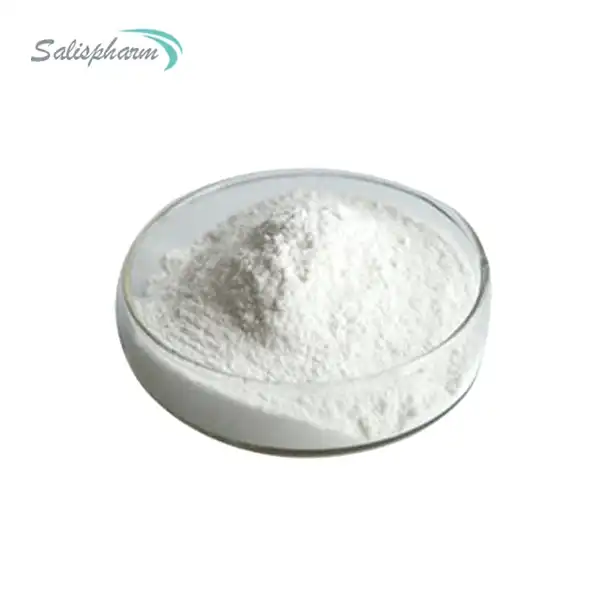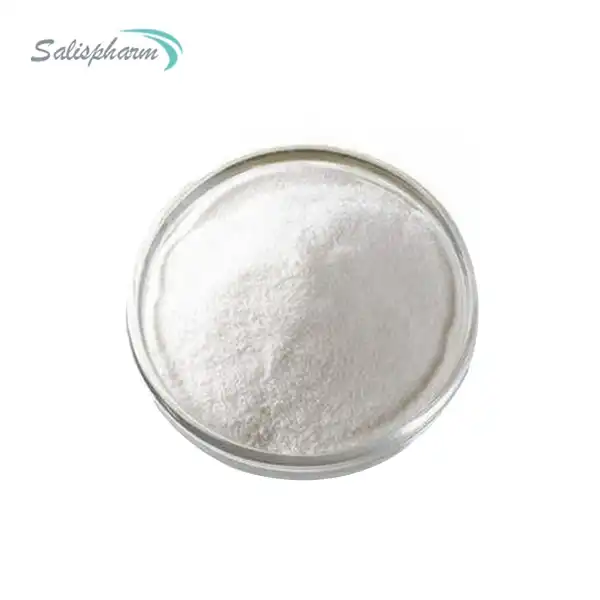Dextromethorphan (DXM) is a cough suppressant commonly found in over-the-counter medications. While it's generally considered safe when used as directed, the use of pure dextromethorphan powder, especially for long-term or recreational purposes, raises significant safety concerns. This blog post will explore the potential risks and considerations associated with long-term use of pure DXM powder, addressing common questions and providing evidence-based information to help readers make informed decisions about their health.
What are the side effects of long-term dextromethorphan use?
Long-term use of dextromethorphan, particularly in its pure powder form, can lead to a range of side effects that may impact both physical and mental health. It's crucial to understand these potential consequences before considering extended use of DXM.
Short-term side effects of DXM use can include dizziness, nausea, vomiting, and impaired motor function. However, prolonged use may lead to more severe and lasting effects. One of the primary concerns is the development of tolerance and dependence. As users continue to take DXM, they may find that they need increasingly larger doses to achieve the desired effects, which can lead to a cycle of escalating use and potential addiction.
Cognitive impairment is another significant risk associated with long-term DXM use. Studies have shown that chronic use can lead to memory problems, difficulty concentrating, and reduced cognitive flexibility. These effects may persist even after discontinuation of use, potentially impacting academic or professional performance and overall quality of life.
Psychological effects are also a major concern. Long-term Dextromethorphan Powder use has been linked to increased risk of depression, anxiety, and psychotic symptoms. In some cases, users may experience persistent dissociative effects, feeling detached from reality or their own body even when not under the influence of the drug.
Physically, prolonged use of DXM can take a toll on various organ systems. The liver, in particular, may be at risk due to its role in metabolizing the drug. Chronic use can lead to liver damage or exacerbate existing liver conditions. Additionally, cardiovascular effects such as increased heart rate and blood pressure may pose risks, especially for individuals with pre-existing heart conditions.
There's also concern about the potential for neurological damage with long-term use. While research in this area is ongoing, some studies suggest that chronic DXM use may lead to changes in brain structure and function, potentially impacting neurotransmitter systems and overall brain health.
It's important to note that the risks associated with long-term DXM use may be amplified when using pure powder form, as it's easier to consume higher doses than with standard formulations. The lack of regulation and potential for contamination in illicitly obtained pure DXM powder also introduces additional safety concerns.
Healthcare professionals strongly advise against the long-term use of DXM, especially in its pure form, due to these potential side effects and the risk of developing substance use disorders. If you or someone you know is using DXM regularly, it's crucial to seek medical advice to address any health concerns and explore safer alternatives for managing symptoms or addressing underlying issues that may be driving the use.
Can dextromethorphan cause permanent brain damage?
The potential for Dextromethorphan Powder to cause permanent brain damage is a serious concern, particularly when it comes to long-term or heavy use of pure DXM powder. While research in this area is still evolving, there is evidence to suggest that chronic DXM use may indeed lead to lasting changes in brain structure and function.
One of the primary mechanisms through which DXM may affect the brain is through its action on the NMDA receptors. DXM is an NMDA receptor antagonist, which means it blocks the activity of these receptors. While this action is part of how DXM produces its effects, prolonged blockade of NMDA receptors has been associated with neurotoxicity in animal studies. This raises concerns about the potential for similar effects in humans with long-term use.
Neuroimaging studies have provided some insight into the potential for brain changes associated with DXM use. Some research has shown alterations in brain white matter integrity in individuals with a history of DXM abuse. White matter is crucial for communication between different areas of the brain, and changes in its structure could potentially impact cognitive function and behavior.
Cognitive deficits observed in long-term DXM users provide further evidence of potential brain damage. Studies have documented impairments in memory, attention, and executive function that persist even after periods of abstinence. While it's not always clear whether these effects are fully reversible, their persistence suggests the possibility of lasting neurological changes.
The risk of brain damage may be particularly pronounced in adolescents and young adults, as their brains are still developing. The plasticity of the developing brain makes it more vulnerable to the effects of substances like DXM, potentially leading to more significant and lasting impacts on cognitive function and mental health.
It's also important to consider the indirect ways in which DXM use could lead to brain damage. For instance, the dissociative effects of DXM can increase the risk of accidents or injuries, which could result in traumatic brain injury. Additionally, the respiratory depression associated with high doses of Dextromethorphan Powder could potentially lead to hypoxic brain injury if severe enough.
The purity and dosage of DXM are critical factors when considering the risk of brain damage. Pure DXM powder allows for much higher doses than would typically be consumed through over-the-counter medications, potentially increasing the risk of neurotoxic effects. Furthermore, the lack of regulation in illicit DXM powder introduces the risk of contaminants or adulterants that could have their own neurotoxic properties.
While more research is needed to fully understand the long-term neurological impacts of DXM use, the existing evidence suggests that there is a real risk of lasting brain changes, particularly with chronic or high-dose use. This underscores the importance of using DXM only as directed for its intended medical purposes and avoiding recreational or long-term use, especially of pure DXM powder.
If you're concerned about potential brain damage from DXM use, it's crucial to consult with a healthcare professional. They can provide a more personalized assessment of your risk factors and recommend appropriate interventions or treatment if necessary. Remember, the best way to prevent DXM-related brain damage is to avoid misuse of the substance altogether.
How does dextromethorphan affect serotonin levels?
Dextromethorphan's interaction with the serotonin system in the brain is complex and multifaceted, making it an important aspect to consider when evaluating the safety of long-term use of pure DXM powder. Understanding how DXM affects serotonin levels can provide insight into both its therapeutic effects and potential risks.
Primarily, DXM acts as a serotonin reuptake inhibitor (SRI). This means it can increase the levels of serotonin available in the synapses between neurons by preventing its reabsorption. While this action is similar to that of some antidepressants, the effects of DXM on serotonin are generally more acute and less regulated than those of prescribed medications designed specifically for this purpose.
The increase in serotonin levels caused by DXM can lead to various effects. In the short term, it may contribute to mood elevation, increased energy, and altered perceptions – effects that some users seek when using DXM recreationally. However, this serotonin boost can also lead to adverse effects, particularly when Dextromethorphan Powder is used in high doses or over extended periods.
One significant concern is the risk of serotonin syndrome, a potentially life-threatening condition caused by excessive serotonin activity in the brain. Symptoms of serotonin syndrome can range from mild (shivering, diarrhea) to severe (muscle rigidity, fever, seizures). The risk of serotonin syndrome is particularly high when DXM is combined with other substances that increase serotonin levels, such as certain antidepressants or illicit drugs like MDMA.
Long-term use of DXM may lead to changes in the brain's serotonin system. Chronic elevation of serotonin levels can potentially lead to downregulation of serotonin receptors, where the brain adapts to the consistently high levels of the neurotransmitter by reducing its sensitivity to it. This can result in a need for higher doses to achieve the same effects and may contribute to the development of tolerance and dependence.
Furthermore, the interaction between DXM and the serotonin system may play a role in the drug's potential to cause mood disturbances with long-term use. While the initial serotonin boost may produce euphoric effects, prolonged use can potentially lead to mood swings, depression, and anxiety, particularly during periods of withdrawal.
The impact of DXM on serotonin may also contribute to its cognitive effects. Serotonin plays a crucial role in various cognitive processes, including memory and learning. The alteration of serotonin levels and function with chronic DXM use could potentially contribute to the cognitive deficits observed in some long-term users.
It's important to note that the effects of DXM on serotonin can be dose-dependent. At lower, therapeutic doses, the impact on serotonin levels may be relatively mild. However, with the use of pure DXM powder, where doses can far exceed those found in over-the-counter preparations, the effects on the serotonin system can be much more pronounced and potentially harmful.
The complex interaction between DXM and serotonin underscores the importance of using this substance only as directed for its intended medical purposes. Long-term or high-dose use of pure DXM powder carries significant risks related to serotonin dysregulation, which can have far-reaching effects on mood, cognition, and overall brain function.
If you're using DXM and experience symptoms that could indicate serotonin syndrome or other serotonin-related issues, it's crucial to seek immediate medical attention. Healthcare providers can assess your symptoms, consider your history of DXM use, and provide appropriate treatment to manage any serotonin-related complications.
In conclusion, the long-term use of pure dextromethorphan powder poses significant risks to both physical and mental health. The potential for side effects, brain damage, and serotonin dysregulation highlights the importance of using DXM only as directed for its intended medical purposes. While DXM can be an effective cough suppressant when used properly, its misuse, particularly in pure powder form, can lead to serious health consequences. If you're concerned about DXM use or experiencing adverse effects, it's crucial to consult with a healthcare professional for guidance and support. Remember, your health and safety should always be the top priority when considering the use of any substance.
If you are also interested in this product and want to know more product details, or want to know about other related products, please feel free to contact iceyqiang@aliyun.com.
References:
1. Schwartz, R. H. (2005). Adolescent abuse of dextromethorphan. Clinical Pediatrics, 44(7), 565-568.
2. Linn, K. A., Long, M. T., & Pagel, P. S. (2014). "Robo-tripping": Dextromethorphan abuse and its anesthetic implications. Anesthesia & Analgesia, 119(4), 973-980.
3. Martinak, B., Bolis, R. A., Black, J. R., Fargason, R. E., & Birur, B. (2017). Dextromethorphan in cough syrup: The poor man's psychosis. Psychopharmacology Bulletin, 47(4), 59.
4. Hendrickson, R. G., & Cloutier, R. (2007). "Crystal Dex:" Free-base dextromethorphan. Journal of Emergency Medicine, 32(4), 393-396.
5. Miller, S. C. (2005). Dextromethorphan psychosis, dependence and physical withdrawal. Addiction Biology, 10(4), 325-327.
6. Bronstein, A. C., Spyker, D. A., Cantilena Jr, L. R., Rumack, B. H., & Dart, R. C. (2012). 2011 annual report of the American Association of Poison Control Centers' National Poison Data System (NPDS): 29th annual report. Clinical Toxicology, 50(10), 911-1164.
7. Bem, J. L., & Peck, R. (1992). Dextromethorphan. Drug Safety, 7(3), 190-199.
8. Mutschler, J., Koopmann, A., Grosshans, M., Hermann, D., Mann, K., & Kiefer, F. (2010). Dextromethorphan withdrawal and dependence syndrome. Deutsches Ärzteblatt International, 107(30), 537.
9. Wiley, J. L., Hennigan, P. J., Compton, D. R., & Martin, B. R. (2007). Evaluation of the behavioral effects of dextromethorphan and its metabolites in mice. Journal of Pharmacology and Experimental Therapeutics, 321(2), 587-593.
10. Boyer, E. W. (2004). Dextromethorphan abuse. Pediatric Emergency Care, 20(12), 858-863.









